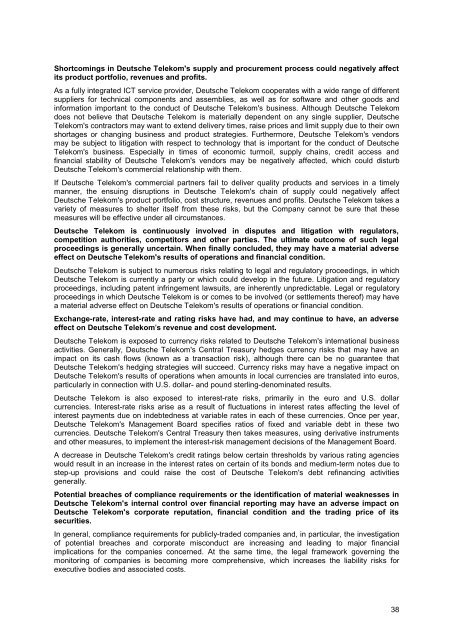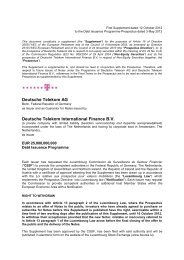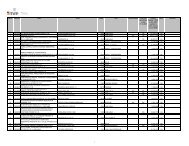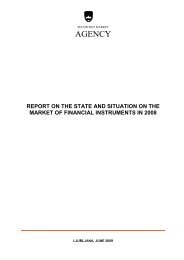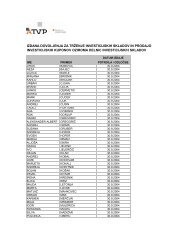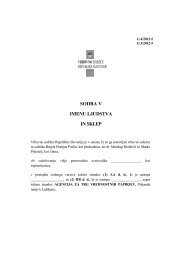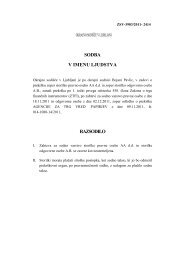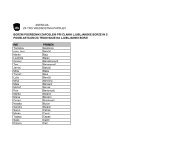Prospectus-Final (clean) - Malta Financial Services Authority
Prospectus-Final (clean) - Malta Financial Services Authority
Prospectus-Final (clean) - Malta Financial Services Authority
- No tags were found...
Create successful ePaper yourself
Turn your PDF publications into a flip-book with our unique Google optimized e-Paper software.
Shortcomings in Deutsche Telekom's supply and procurement process could negatively affectits product portfolio, revenues and profits.As a fully integrated ICT service provider, Deutsche Telekom cooperates with a wide range of differentsuppliers for technical components and assemblies, as well as for software and other goods andinformation important to the conduct of Deutsche Telekom's business. Although Deutsche Telekomdoes not believe that Deutsche Telekom is materially dependent on any single supplier, DeutscheTelekom's contractors may want to extend delivery times, raise prices and limit supply due to their ownshortages or changing business and product strategies. Furthermore, Deutsche Telekom's vendorsmay be subject to litigation with respect to technology that is important for the conduct of DeutscheTelekom's business. Especially in times of economic turmoil, supply chains, credit access andfinancial stability of Deutsche Telekom's vendors may be negatively affected, which could disturbDeutsche Telekom's commercial relationship with them.If Deutsche Telekom's commercial partners fail to deliver quality products and services in a timelymanner, the ensuing disruptions in Deutsche Telekom's chain of supply could negatively affectDeutsche Telekom's product portfolio, cost structure, revenues and profits. Deutsche Telekom takes avariety of measures to shelter itself from these risks, but the Company cannot be sure that thesemeasures will be effective under all circumstances.Deutsche Telekom is continuously involved in disputes and litigation with regulators,competition authorities, competitors and other parties. The ultimate outcome of such legalproceedings is generally uncertain. When finally concluded, they may have a material adverseeffect on Deutsche Telekom's results of operations and financial condition.Deutsche Telekom is subject to numerous risks relating to legal and regulatory proceedings, in whichDeutsche Telekom is currently a party or which could develop in the future. Litigation and regulatoryproceedings, including patent infringement lawsuits, are inherently unpredictable. Legal or regulatoryproceedings in which Deutsche Telekom is or comes to be involved (or settlements thereof) may havea material adverse effect on Deutsche Telekom's results of operations or financial condition.Exchange-rate, interest-rate and rating risks have had, and may continue to have, an adverseeffect on Deutsche Telekom's revenue and cost development.Deutsche Telekom is exposed to currency risks related to Deutsche Telekom's international businessactivities. Generally, Deutsche Telekom's Central Treasury hedges currency risks that may have animpact on its cash flows (known as a transaction risk), although there can be no guarantee thatDeutsche Telekom's hedging strategies will succeed. Currency risks may have a negative impact onDeutsche Telekom's results of operations when amounts in local currencies are translated into euros,particularly in connection with U.S. dollar- and pound sterling-denominated results.Deutsche Telekom is also exposed to interest-rate risks, primarily in the euro and U.S. dollarcurrencies. Interest-rate risks arise as a result of fluctuations in interest rates affecting the level ofinterest payments due on indebtedness at variable rates in each of these currencies. Once per year,Deutsche Telekom's Management Board specifies ratios of fixed and variable debt in these twocurrencies. Deutsche Telekom's Central Treasury then takes measures, using derivative instrumentsand other measures, to implement the interest-risk management decisions of the Management Board.A decrease in Deutsche Telekom's credit ratings below certain thresholds by various rating agencieswould result in an increase in the interest rates on certain of its bonds and medium-term notes due tostep-up provisions and could raise the cost of Deutsche Telekom's debt refinancing activitiesgenerally.Potential breaches of compliance requirements or the identification of material weaknesses inDeutsche Telekom's internal control over financial reporting may have an adverse impact onDeutsche Telekom's corporate reputation, financial condition and the trading price of itssecurities.In general, compliance requirements for publicly-traded companies and, in particular, the investigationof potential breaches and corporate misconduct are increasing and leading to major financialimplications for the companies concerned. At the same time, the legal framework governing themonitoring of companies is becoming more comprehensive, which increases the liability risks forexecutive bodies and associated costs.38


